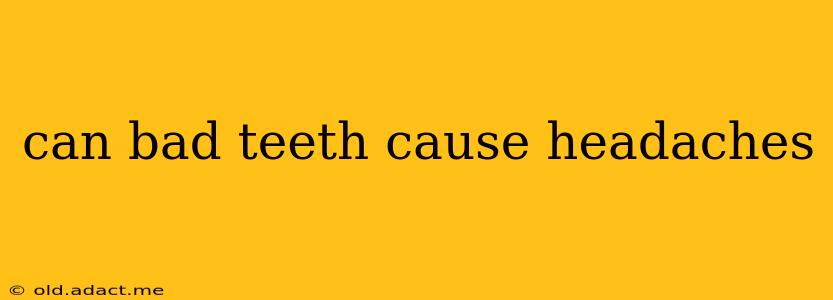Headaches are a common ailment, affecting millions worldwide. While stress, dehydration, and sinus issues are frequently cited culprits, many overlook a potential source closer to home: your teeth. The connection between bad teeth and headaches might seem surprising, but it's a valid concern with a growing body of research supporting it. This comprehensive guide explores the link between dental problems and headaches, offering insights into the causes, symptoms, and treatment options.
How Can Bad Teeth Lead to Headaches?
The intricate relationship between your teeth and your head isn't immediately obvious, but it involves several pathways. Problems in your jaw, teeth, and surrounding tissues can trigger a cascade of events leading to headaches.
-
Temporomandibular Joint (TMJ) Disorders: The TMJ is the joint connecting your jawbone to your skull. Problems like TMJ disorders (TMD) are a common cause of headaches. Misalignment, injury, or inflammation of the TMJ can cause pain that radiates to the head, temples, and even the neck. Grinding or clenching your teeth (bruxism), often stemming from stress or sleep disorders, significantly exacerbates TMJ issues.
-
Dental Infections: Severe tooth decay, abscesses, or gum disease (periodontitis) can cause significant pain and inflammation. These infections can trigger referred pain, meaning pain originating in one area is felt in another. The nerves in your jaw and face are interconnected, so an infection in a tooth can easily cause a headache.
-
Sinus Infections: While not directly related to the teeth, sinus infections frequently accompany dental problems, particularly those affecting the upper teeth. Inflammation and pressure build-up in the sinuses can radiate pain to the head, often mistaken for a tension headache.
What Types of Headaches Can Bad Teeth Cause?
The type of headache associated with dental problems varies depending on the underlying cause. You may experience:
-
Tension Headaches: These are the most common type and are often characterized by a dull, aching pain around the head and neck. TMJ disorders and stress related to dental pain frequently contribute to tension headaches.
-
Migraines: While not directly caused by bad teeth, dental problems can trigger migraines in susceptible individuals. The pain associated with a toothache or TMJ dysfunction can act as a trigger for a migraine episode.
-
Cluster Headaches: These are less common but incredibly severe. While the connection between dental issues and cluster headaches is less well-established, some research suggests a possible link, particularly concerning TMJ dysfunction.
What are the Symptoms of Headaches Related to Teeth?
Identifying headaches caused by dental problems requires paying attention to accompanying symptoms. Besides the headache itself, you may experience:
- Jaw Pain or Stiffness: This is a key indicator, often associated with TMJ disorders.
- Facial Pain: Pain in the face, particularly around the jaw, cheeks, or temples, can point to a dental origin.
- Toothache: Obvious tooth pain is a direct sign of a dental problem potentially leading to headaches.
- Sensitivity to Pressure or Chewing: Difficulty chewing or pain when pressing on teeth indicates potential issues.
- Clicking or Popping in the Jaw: This is a classic symptom of TMJ disorders.
Can a Dentist Help with Headaches?
Yes, absolutely! A dentist plays a crucial role in diagnosing and treating headaches linked to dental problems. They can identify:
- TMJ disorders: Your dentist can diagnose TMJ dysfunction and recommend treatments such as mouthguards, physical therapy, or splints to alleviate pressure on the joint.
- Dental Infections: They'll address infections through root canals, extractions, or other appropriate procedures.
- Grinding or Clenching: They can identify bruxism and recommend custom-made night guards to protect your teeth and jaw joint.
How are Headaches from Bad Teeth Diagnosed?
Diagnosis involves a thorough examination by your dentist and possibly referrals to other specialists, such as an orthodontist or oral surgeon. They will assess your:
- Jaw joint: Examining for range of motion, clicking sounds, and tenderness.
- Teeth: Checking for decay, gum disease, and misalignment.
- Bite: Analyzing your bite to identify any irregularities.
- Medical history: Understanding your headache history and any pre-existing medical conditions.
What are the Treatment Options for Headaches Caused by Bad Teeth?
Treatment varies depending on the underlying cause. It may include:
- Dental Procedures: Root canals, fillings, extractions, or gum disease treatment.
- TMJ Therapy: Mouthguards, splints, physical therapy, or medication.
- Pain Management: Over-the-counter pain relievers, prescription medications, or other pain management strategies.
- Stress Management Techniques: Techniques like relaxation exercises or therapy, especially for stress-related bruxism.
Can I Prevent Headaches Caused by Dental Issues?
Preventive measures can significantly reduce your risk:
- Regular Dental Checkups: Visiting your dentist for routine checkups and cleanings is crucial for early detection and treatment of dental problems.
- Proper Oral Hygiene: Practicing good oral hygiene, including brushing and flossing twice daily, helps prevent cavities and gum disease.
- Stress Management: Implementing stress-reducing techniques can minimize bruxism.
- Healthy Diet: A balanced diet supports healthy teeth and gums.
In conclusion, the link between bad teeth and headaches is a real and often overlooked connection. If you experience persistent headaches, particularly those accompanied by jaw pain or other dental symptoms, consult your dentist. Early diagnosis and treatment can prevent more serious complications and improve your overall well-being.
